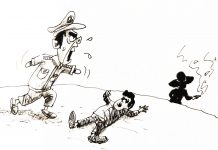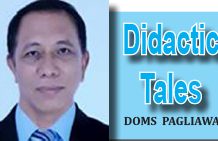The posters are new on the walls, their faces pulled into courteous smiles and words reciting vows—”matatapuran,” “ubos nga surugu-on,” “tangkod.” But once they get elected into office, their titles change into: “talahuron,” “harangdon,” “honorable.” It’s a high-stakes sleight of hand, a switcheroo of words designed to leave the rest of us agog on the stage, not a whit wiser to the trick. Call it what it is—foolishness dressed up in the patois of wonder.
During the run-up to election time, candidates strut their humility like buskers, genuflecting and patting the poor and the weary on the head. They present us with their unbending servitude, their lips running with self-abasing jargon. “Ubos nga surugu-on,” they declare, swearing loyalty not to power or money, but to the fingers stained with the soil of tillers and the backs bent with wares of market vendors. They employ this jargon because it is salable—the modesty of a servant is the armor of a politician seeking votes.
Humility is a facade, discarded after the last ballot has been cast. Now they stand taller, their voices deeper, their blazers crisp. Those are days gone by when individuals carried the burdens of the masses; now, it is the masses carrying the burdens of their own egos. Being referred to as “harangdon” is no longer a title but a wall, a barrier that distances the formerly amiable candidate from the masses that they woo. Language in such a context is a statement of distance.
And we’re guilty, aren’t we? We adapt our tongues to their new grandeur. The same man who clasped hands in the plaza and grinned through roadside pancit canton lunches now enters rooms where people stand in respect. He is no longer ‘Manoy Juan’ but ‘Honorable Juan,’ and to criticize him is to commit a sacrilege. The terms we once used to draw him near now drive him beyond our reach.
Words are not just noise, anyway. They map how we see the world, and in which we make it work. When the leader positions himself as a servant, it encourages responsibility—a reminder that their throne of power rests on our shoulders. But when they go “harangdon,” something strange reverses. Their mistakes are right, and their decisions are beyond questioning. The title becomes heavier than the expectations that once held them to the earth.
Others would argue that titles such as ‘honorable’ or ‘talahuron’ are mere traditions, leftovers of colonial systems, or misplaced respectability. But decisions are actions, and actions tell volumes about intentions. Our leaders choose to surround themselves with words that ask for surrender. They can claim respect is necessary to have order, but respect is not a lapel badge—it is earned, like trust, through action.
But truly the foolishness is not so much in what they say. It is in how easily we accept it. We berate the foolishness and then lower our heads. We clench our fists and yet continue to put our “Hon.” before their names. Political change will never emanate from politicians themselves; it will emanate from us—from the moment we stop accepting imitative words that take away the power of the people. As of the day when we no longer believe that a word, however beautiful, can conceal the truth.
Let them title themselves whatever they please. But let us not forget that the greatest title that any leader can have is one that we give freely, without pretense or fanfare. And that is simply: “Tangkod.” Honest, true, and loyal to the people’s beliefs. No ribbon needs to be added.




